For MTSU junior aerospace technology major Mervyn Thomas-Crawford, participation in the latest Black Male Lecture Series coordinated by the Office of Student Success showed him the importance of preparing yourself mentally for the things you want to achieve in life.
The Baltimore, Maryland, native was among four students who recently shared reflections from their experience with former NFL player Jay Barnett, an author, speaker, family therapist and mental health coach who led the participating students through his K.I.N.G. program, which stands for Kindling Innovation Necessary for Growth.
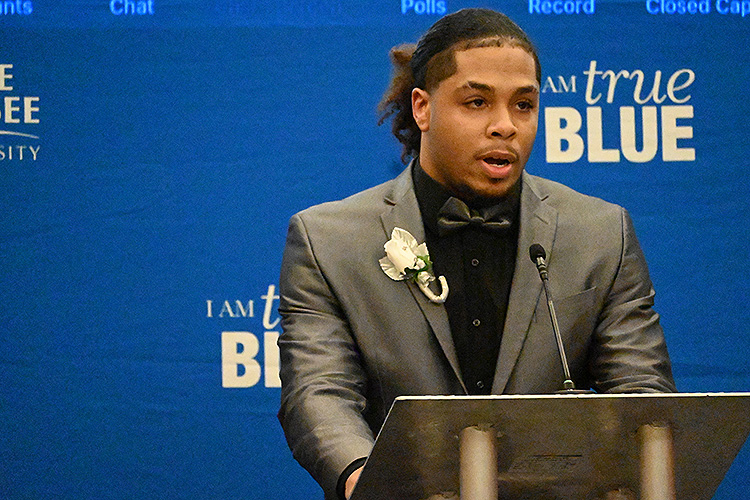
MTSU junior aerospace technology major Mervyn Thomas-Crawford of Baltimore, Maryland, shares reflections on his participation in the latest Black Male Lecture Series by the Office of Student Success at the closing ceremony held Feb. 18 in the Student Union Ballroom. (MTSU photo by Jimmy Hart)
“One of the things that the K.I.N.G. program pitched was having a ‘finish strong’ mentality and to have the ability to grow,” Thomas-Crawford shared with fellow program participants and supporters inside the Student Union Ballroom during the series’ closing ceremony.
“(And) to prepare yourself to build confidence, to seek opportunities and to finish strong, while at the same time being prepared for anything that you do. … It was an amazing program that provided a safe space for all of us to open up to each other.”
MTSU’s Office of Student Success hopes to help improve graduation and persistence rates among the university’s Black male students through the lecture series aimed at developing their individual identities and deepening their engagement in campus life. Barnett led a series of mostly virtual sessions that began last August.
Speakers: Get what you came here for
With Barnett joining the ceremony virtually, program participants also received words of inspiration in person from MTSU Board of Trustee member and alumnus Darrell Freeman, who urged the students to “get what you came here for” by attending MTSU.
“There are people who are going to be looking up to you. They’re going to be relying on you. People that you don’t even know,” said Freeman, a successful entrepreneur and pilot. “That’s why this program is pouring into you. We understand how much value you’re going to bring to this country, to the world, to our communities. … Y’all need to get what you came here for, and you can do it!”
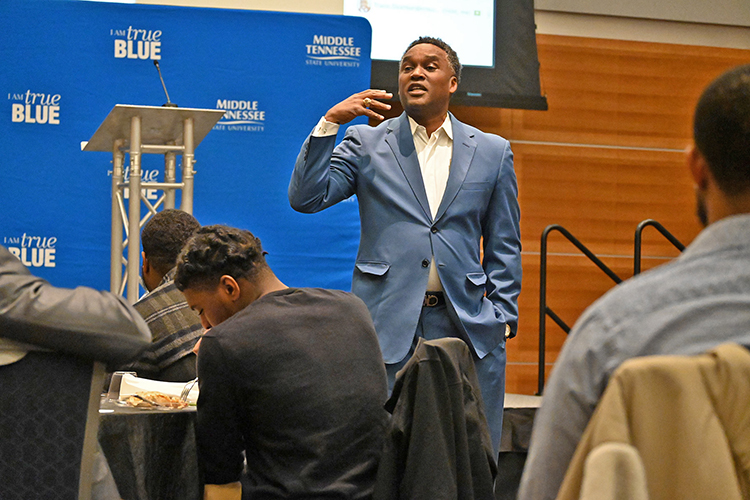
MTSU Board of Trustees member and alumnus Darrell Freeman speaks to participants in the latest Black Male Lecture Series by the Office of Student Success at the closing ceremony held Feb. 18 in the Student Union Ballroom. (MTSU photo by Jimmy Hart)
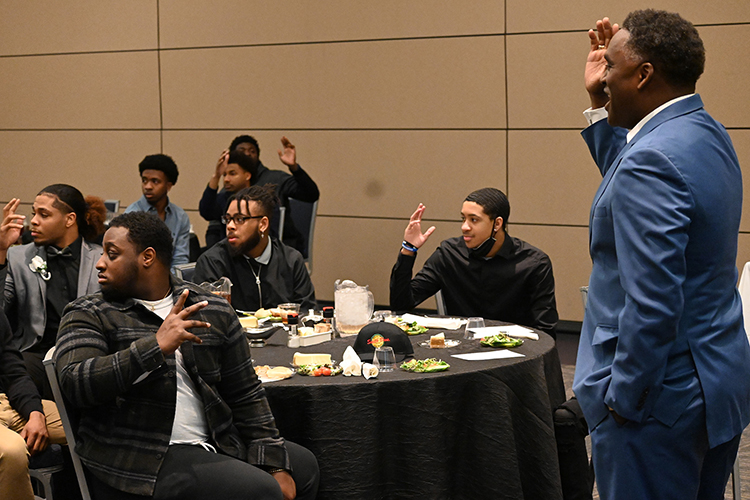
MTSU Board of Trustees member and alumnus Darrell Freeman speaks to participants in the latest Black Male Lecture Series by the Office of Student Success at the closing ceremony held Feb. 18 in the Student Union Ballroom. (MTSU photo by Jimmy Hart)
Piping in via Zoom on a large video screen at the front of the ballroom, Barnett echoed Freeman’s encouragement, congratulating the program graduates and thanking them for their contributions to his program and outreach, which focuses on “bringing brothers together to connect, bringing brothers together to heal, bringing brothers together to understand that they are not alone.”
“As a man, you’re always going to be defined by your level of commitment, no matter what anyone tells you,” said Barnett, recalling his first year of college football when some teammates would quit in the middle of the night because pre-season camp was too hard for them. “Can you be committed to something? Can you finish?”
“This is going to be the most pivotal time in your life to take all that you’re going to can get,” he added. “Life is about the relationships that you’re going to build. How profitable can the relationships you build be beyond the connection? … Again, what did you come here for? And if you don’t get what it can give you, WHY ARE YOU HERE?”
Barnett reminded the graduates that being committed to their goals won’t be easy and becomes even more in today’s culture that “is really infatuated with instant gratification” and the false impressions found throughout social media of instant success.
“You may have to wait for the high-paying job. You may have to wait to build your character, to develop your craft, to develop your skill set,” he said. “What you decide to do with your life and how you get there will be contingent upon your level of participation.”
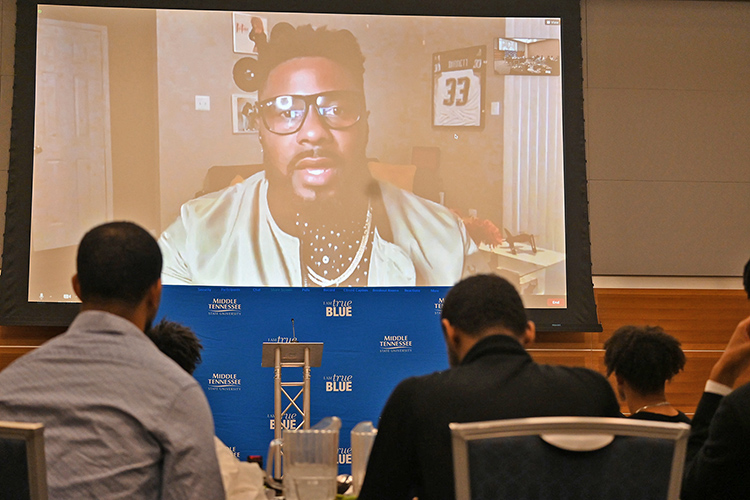
Participating on screen via Zoom, former NFL player Jay Barnett, an author, speaker, family therapist and mental health coach, addresses graduates of the latest Black Male Lecture Series by the Office of Student Success during the closing ceremony held Feb. 18 in the Student Union Ballroom. Barnett led the participating students through his K.I.N.G. program, which stands for Kindling Innovation Necessary for Growth. (MTSU photo by Jimmy Hart)
‘I’ve learned to slow down’
Also sharing reflections at the closing ceremony were senior commercial songwriting major Joshua Gray of St. Louis; junior criminal justice administration major Quendares Young of Memphis, Tennessee; and freshman biology major Emmanuel Bracey of Clarksville, Tennessee.

Quendares Young
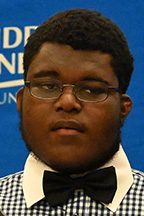
Emmanual Bracey
Young shared his background of growing up poor and having legal problems to changing his environment and graduating from Southwest Tennessee Community College with a 3.7 GPA and now being on track to graduate from MTSU with a bachelor’s degree while already working professionally in a supervisory role.
But for most of his 24 years of life, Young said he’s had the mentality of “go, go, go, go, go.”
“I’ve learned to slow down, take my time and let things come to me,” he said. “Being around an older Black male like Mr. Barnett and having someone to actually sit down and talk to me was very important, because for so long I didn’t have that. I was my own mentor.
“I needed more Black men to just be like, ‘Be patient and heal. You need to sit down with yourself and heal,” Young said.
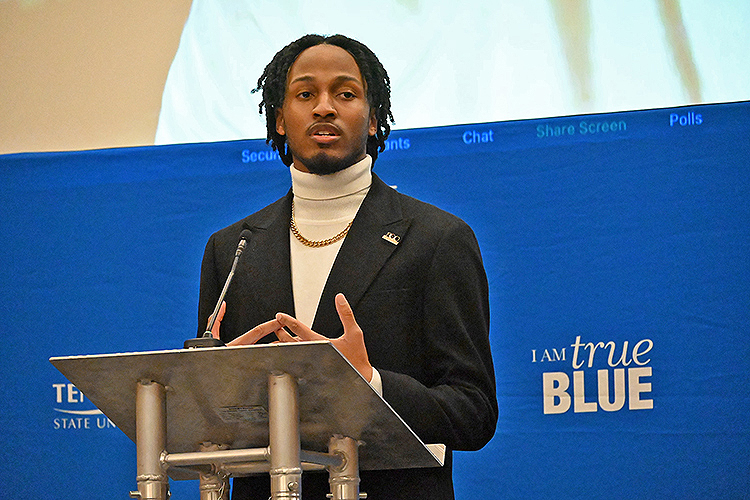
MTSU senior commercial songwriting major Joshua Gray of St. Louis shares reflections on his participation in the latest Black Male Lecture Series by the Office of Student Success at the closing ceremony held Feb. 18 in the Student Union Ballroom. (MTSU photo by Jimmy Hart)
Gray said that he realized that “I’m a human being. I am not a machine, I am not someone who has it all the way together. I’m still learning and I’m still growing, and I know we all are, too.”
“Being in this program has provided me a safe space to not feel like I am a machine, to not feel like I have to perform or overwork myself,” he added. “I was just able to be Josh, I didn’t have to be perfect.”
Gray said he enjoyed being able to sit in a group setting with other young Black men and have the benefit of engaging an actual therapist who was also a Black man, “a rarity in this society,” he said, adding that a key insight he gained from participation in the program “was patience, having patience with myself … and setting boundaries.”
Said Bracey: “This program has helped me as a man, both spiritually and also as a student as well. It helped me to improve my internal emotions because I tended to bottle some of my emotions up. … Thanks to Jay teaching me how to manage that by writing down how I felt.
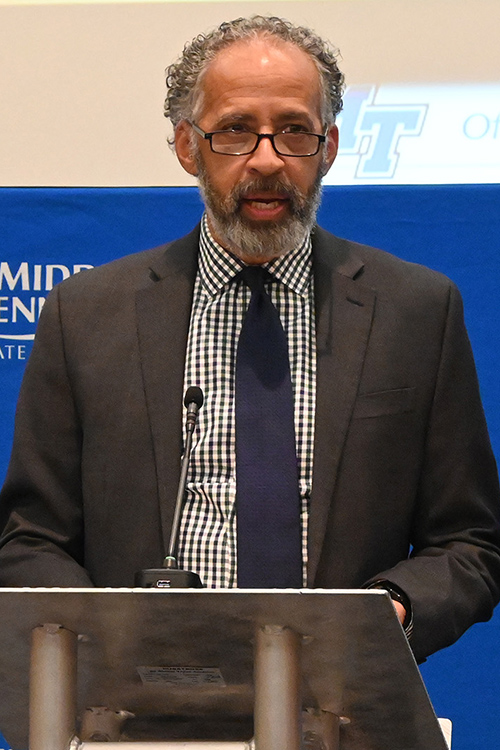
Vincent Windrow, associate vice provost for student success at MTSU, speaks to participants in the latest Black Male Lecture Series by the Office of Student Success at the closing ceremony held Feb. 18 in the Student Union Ballroom. (MTSU photo by Jimmy Hart)
“This program has also helped me to understand that it’s my future to create. I need to put in the hard and prove to others as well as myself that I can make it.”
‘Nothing just happens’
The Black Male Lecture Series was launched a few years ago to address the sometimes unique challenges faced by this population of students by hosting a variety of Black career professionals to expose students to possible career paths and networking.
Vincent Windrow, associate vice provost for student success, commended Brelinda Johnson, manager of the Scholars Academy, and Travis Strattion, assistant manager of the Scholars Academy, for
“Nothing just happens,” Windrow told the students. “I know for a fact that they work tirelessly to support you, to ensure that doors of opportunity are open for you. … They are committed to your success. Your debt to them is to succeed. Your debt to them is to make it happen.”
For more information about the Black Male Lecture Series through the Office of Student Success, contact Strattion at Travis.Strattion@mtsu.edu.
— Jimmy Hart (Jimmy.Hart@mtsu.edu)
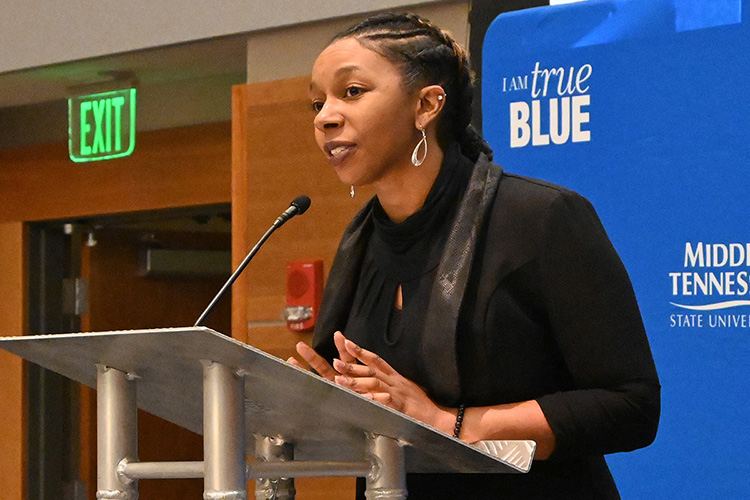
MTSU Scholars Academy Manager Brelinda Johnson speaks to participants in the latest Black Male Lecture Series by the Office of Student Success at the closing ceremony held Feb. 18 in the Student Union Ballroom. (MTSU photo by Jimmy Hart)
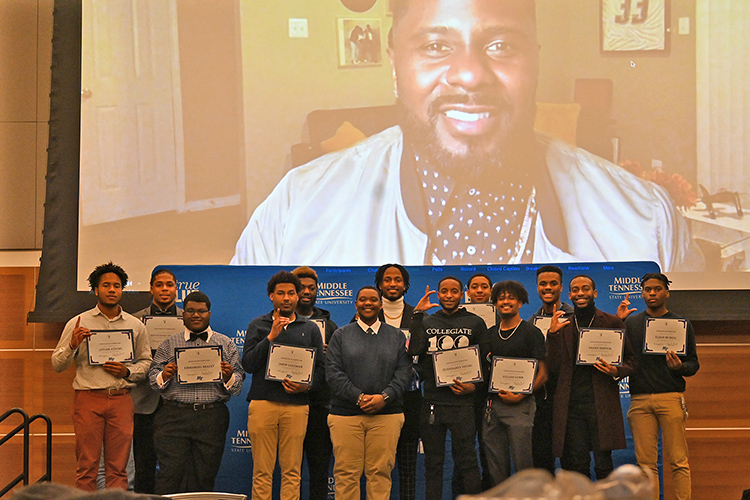
MTSU Scholars Academy Assistant Manager Travis Strattion, center, poses with graduates of the latest Black Male Lecture Series by the Office of Student Success after the closing ceremony held Feb. 18 in the Student Union Ballroom. In the background on the video screen and participating via Zoom is series speaker and former NFL player Jay Barnett, an author, speaker, family therapist and mental health coach who led the participating students through his K.I.N.G. program, which stands for Kindling Innovation Necessary for Growth. (MTSU photo by Jimmy Hart)

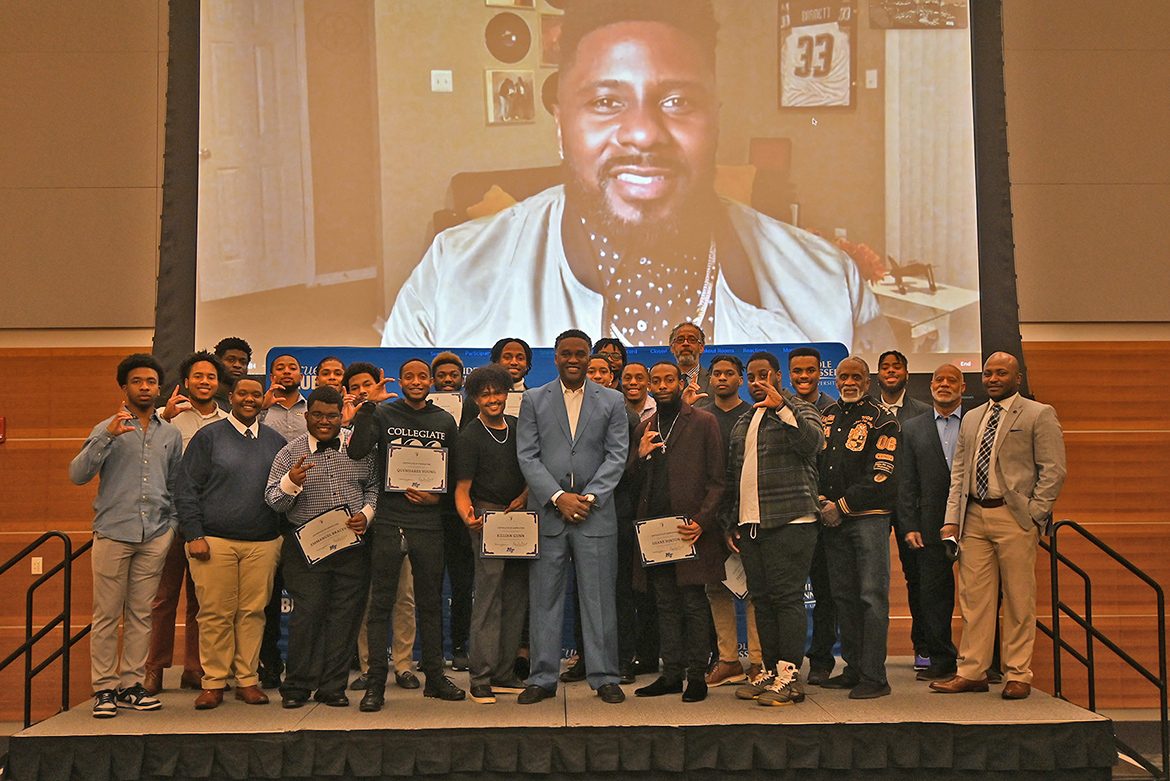
COMMENTS ARE OFF THIS POST